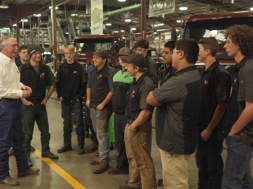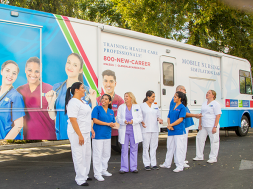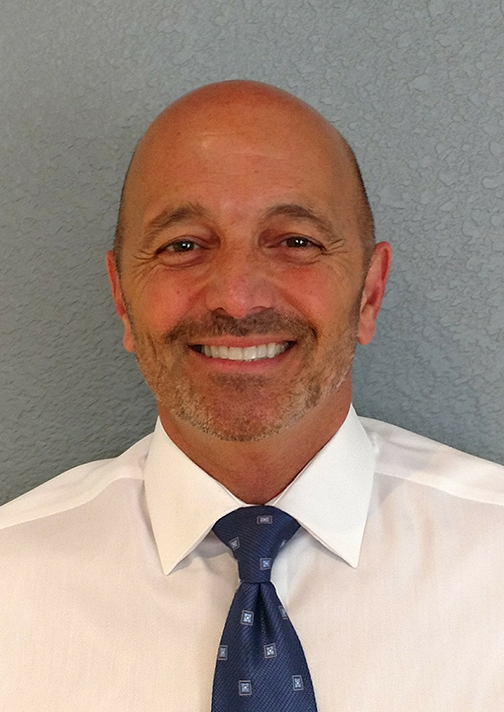
Palmieri: We Need to get our Elected Representatives into our Schools
Interview with Tony Palmieri, President/CEO, Valley College
Leadership. Webster’s New World Dictionary defines it as the ability to lead, command, direct or guide. Peter Drucker, management consultant and author, once said: “Management is doing things right; leadership is doing the right things.”
What are the right things and how do you lead effectively? That’s what “Career Education Review” hopes to uncover, and much more, in its series on leaders within the career education sector.
Q: Tell us about your background in career education?
A: I am a Chemical Engineer and spent my early career in process engineering followed by technology sales primarily to researchers at higher education institutions. My career in the sector started in 2002 when I co-founded a school that was eventually sold to a nonprofit institution. Then I became the Director of Sales for Campus Management for three years; that was a great experience because I was exposed to dozens of career schools, business models and owners. That experience shaped my perspectives on operational and ownership best practices. In August 2011, I purchased Valley College.
Q: Tell us about Valley College?
A: Valley College celebrates its 31st anniversary this year in West Virginia. It began as a secretarial school in 1987 and had 100 students and three programs when I acquired it in 2011. Today we have over 500 students and eight programs between three ground campuses and online. Medical Clinical Assisting is our biggest program; Allied Health, Business and Cybersecurity are equally popular online.
Q: What makes Valley College stand out from other schools?
A: A common theme we hear from our students is that we NEVER give up on them, even when they think they are past trying. To achieve that we live the mantra, “it takes a village.”
Our “village” in every department and at every level understands that we have been trusted with someone’s future.
That person had the “spark” and an idea of how their life could change if only they could finish school. When all of life’s challenges threaten their dream, we deploy a set of response mechanisms and resources, implemented by many people who care so much, and we more often than not help that person persevere. Most often this happens daily in discreet, managed interactions between our academic staff and students. For larger issues, we use a “Distressed Student Activity” that we set up in our CampusVue administrative system when a student expresses a challenge that a faculty or staff member feels warrants greater attention. Every student-facing staff member can set one up. This activity notifies the village – designated operational, academic and management team members – to alert them to a pending challenge. The Director of Academic Affairs leads the effort, consults with the village and creates an intervention plan to assist the student. Resources to support students include internal advising as well as external partners (social service agencies, mainly) to assist with the common student challenges which we call “the big 5,” day care, transportation, medical issues, substance abuse and domestic abuse.
Q: What is your most successful program(s) and why do you believe it is successful?
A: Medical Clinical Assisting (MCA) is our most successful program. We focus only on programs that are in-demand by area employers in our relatively small markets and deliver them through a passionate and effective academics team. We choose and develop these programs by consulting with our Program Advisory Committee on a regular basis, broader surveys of area employers and monitoring of agency-furnished data. Our local workforce offices, for example, maintain “in-demand” occupation lists. MCA meets that demand in every one of our markets. Almost one-third of our students are referrals from current students and alumni which helps maintain the popularity of the program and success of our students. Many students and alumni simply refer others, and we have many multi-generational students (typically mother/daughter, but we’ve also had grandmother/mother/daughter and siblings). We also ask our students to refer friends and family.
Q: What changes/ideas have you implemented that have helped make Valley College successful?
A: When I arrived we had people who cared but had little resources to support their efforts. I focused on improving infrastructure, processes and preservation of our “culture of caring” while hiring new staff and growing the student population. Infrastructure and carefully developed and refined processes create efficiencies such that more of our efforts can be focused on caring for students and less on tasks.
This enables our greatest resource, our people, to do what they do best. By far we are successful because of our passionate faculty and staff.
Since I arrived we have expanded and upgraded all of our campuses with modern amenities, installed a comprehensive student administration system, an integrated online learning management system, a texting solution and VOIP phone system, so our disparate locations are linked as one. We’ve implemented a comprehensive employee “life cycle” model to successfully onboard, develop and advance our staff. We’ve wrapped this with an interdepartmental process development model guided by our Institutional Assessment and Improvement Plan that makes us adaptable to change over time.
Q: What makes you a successful leader?
A: Communications and caring. I communicate vigorously at all levels of the organization. Everyone is aware of my vision (to achieve stable, healthy growth while preserving our culture, maintaining compliance and adding value to our communities), our mission (as a community-based, career-oriented training provider) and our five “values” (integrity, effectiveness, leadership, teamwork and growth) that drive everything we do. I meet all new hires, meet with most staff members when I visit each campus and hold a quarterly “State of the College” update via conference call and slide presentation with everyone in the college. Everyone understands our goals and how they fit into our plan. And I care deeply that the goals of our staff members align with those of the college, so they achieve personal and career fulfillment and are happy to report to Valley College every day. We recognize staff employment anniversaries with certificates, plaques, apparel and dinners (at 1, 3, 5, 10 and yes, 20 years) and we hold an annual “Values Awards” ceremony to recognize staff members for best exhibiting each value we hold dear. We also award a unique “Purple Paint” award (a purple paint-dipped brush) to the one staff member who goes “over and above” all year to serve Valley College and its students (the award is from a story about a staff member who said he would paint the parking lot purple if I asked). And finally, we recognize an Admissions Rep of the Year and Faculty Member of the Year (per campus and online). We have some fun while letting our staff know how thankful we are for their contributions and dedication to our students. We all like to be recognized, and happy staff members go the extra mile to care for our students and to preserve our precious culture.
Q: How would you describe your management style? Why do you think it works?
A: My management style is hands-on. I am involved and aware. Everyone knows they can depend on me anytime and anywhere to help. And when things go wrong, we have a culture where we focus not on blame but on problem-solving and corrective action to continuously improve. That works because it instills confidence in our teams to work autonomously within our carefully defined framework and to expect support rather than fear retribution when things don’t work.
Q: How do you keep your staff motivated?
A: We try to hire caring people who understand our vision and mission to serve our students. We strive to understand their goals and seek alignment with ours. And we keep them involved in our plans, so they understand their role and impact on our outcomes, which are all geared to student success. Then we yield autonomy within our compliance framework, so they can execute as the business professionals we expect them to be. It’s that ownership of their role and how it impacts someone’s very future that keeps us all motivated.
Q: What are your current challenges in your position? How do you overcome them?
A: The greatest challenge is to preserve our precious, caring and compliant culture in disparate locations and with growth. We do this by continuous reinforcement of our mission and values, constant analysis of outcomes, internal auditing and training.
Q: What do you think are the largest challenges facing career education?
A: I will speak for tax-paying (for-profit) career education. For many of us, our outcomes generally exceed those of many other choices our students can make in our local markets. Yet a few bad examples tarnish the majority of us who have created a caring, giving and safe community in our schools that feels like family and which often gives our students their last chance for a better future.
To change that, we (and, more importantly, our students) need legislative allies on both sides of the aisle. Our message needs to be “get to know our students and us.”
And the only way to do that is to get our elected representatives into our schools! Let them see and hear firsthand from our students and our employers why our school is important to them. Schedule a tour and include an employer roundtable. Invite them to speak and hear heartfelt, life-changing stories at our graduation ceremonies. With this firsthand knowledge our representatives can “stand up for our schools and our students,” their constituents, many of which are the most vulnerable in their communities! We have power in numbers – more than a million students and families whose support our representatives would like to earn – but we have to do the work to create and nurture these relationships.
Q: What do you see as the future of higher education in 5-10 years? What about career education?
A: I believe higher education will be doing something very similar in 5-10 years, albeit shaped more by technology advances than political forces, especially in the traditional sector. Who can believe ubiquitous use of smart phones is less than 10 years old? The future of private, tax-paying (for-profit) career education, on the other hand, could be at risk unless we educate our legislators about what we mean to those in our society who truly need us most.
Q: If you could give one tip to other leaders in the career education sector what would it be?
A: Operate with the highest level of integrity and be beyond reproach. At Valley College, this is our #1 value. We say, “do the right thing for our students and their families, and everything comes our way.” Never waver and never worry.
Q: Is there anything you would like to add that I didn’t ask?
A: I can’t overemphasize the fact that we need legislative allies to stand up for our students and our schools. I challenge every owner and senior executive with decision authority to take action now because relationship development takes time. Host a visit of your local representatives. It’s very similar to planning an open house. Your representatives want to meet and hear from your students. They also want to hear from employers who hire your students (a CEO roundtable is effective). If your representatives are not responsive, get your students (head of Student Government Associations are perfect) to reach out and make the request. Let’s give our representatives the knowledge they need to “stand up for career education” and to disarm our critics whose words and actions may hurt the very people they say they want to protect. Let’s protect them together!
You can learn more about how to conduct a legislative visit at the CSPEN Conference in Chicago, August 6-8, 2018. Attend and participate! In the meantime, read this informative article by Tom Netting, Co-Executive Director of CSPEN, “How to Conduct a Legislative Visit and Why You Need to do it Now.” The article was published in CER and can be found on their website (https://www.careereducationreview.net/2016/06/how-to-conduct-a-legislative-visit-and-why-you-need-to-do-it-now/). Read it and schedule your legislative visits now!
TONY PALMIERI is President and CEO of Valley College which has three ground campuses and an Online school in West Virginia.
Contact Information: Tony Palmieri // President/CEO // Valley College // 304-263-0979 // tpalmieri@valley.edu // https://www.valley.edu









